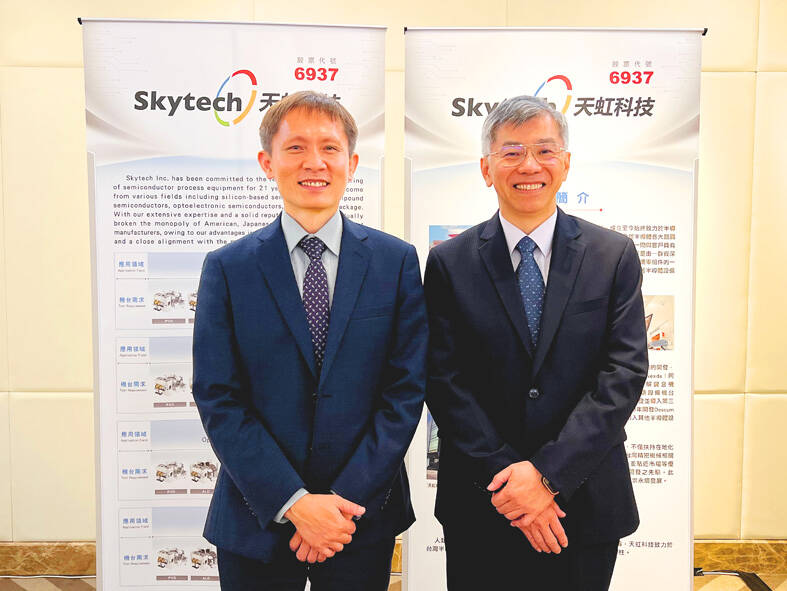Shares of semiconductor equipment maker Skytech Inc (天虹科技) soared 85.22 percent in the company’s debut on the Taiwan Stock Exchange, closing at NT$213, compared with the firm’s initial public offering price of NT$115.
Skytech aims to boost its revenue by 20 percent next year, outpacing the expected growth of the overall semiconductor industry.
The Hsinchu-based firm is among only a few Taiwanese companies that design and produce key equipment used in the chip manufacturing process.

Photo: Grace Hung, Taipei Times
It has a broad customer base that includes Taiwan Semiconductor Manufacturing Co (TSMC, 台積電).
Skytech’s revenue in the first three quarters of this year grew 12.83 percent year-on-year to NT$1.34 billion (US$42.53 million), with 70 percent generated by equipment used to produce compound semiconductors.
“We are looking at faster [revenue] growth than the overall semiconductor industry next year. That is our internal target,” Skytech chairman Paul Huang (黃見駱) told a media briefing in Taipei on Monday. “The main growth driver will come from the third-generation semiconductor, or compound semiconductor, segment primarily from China.”
Skytech expects revenue to climb to a new high next year, when the global semiconductor industry is expected to resume growth, expanding by 20 percent, according to an estimate by market researcher IDC Corp.
Skytech produces physical vapor deposition (PVD) and atomic layer deposition (ALD) equipment and charges 20 percent less than its major competitors.
ALD equipment an important part of next-generation semiconductor manufacturing.
The global PVD market is expected to expand at an annual compound rate of 5.8 percent to US$45.86 billion from last year to 2029, with the fastest growth in the Asia-Pacific region, Maximize Market Research said last month.
Applied Materials Inc is a key player in the PVD market, it said.
Skytech said it is working with its customers to design new equipment used in advanced technologies from 2.5-dimension to 3-dimension packaging technologies such as chip-on-wafer-on-substrate technology, as well as new silicon photonics technology, which ASE Technology Holding Co (日月光投控), the world’s biggest chip packager, and TSMC consider a crucial technology for the future of semiconductor manufacturing.
Skytech also supplies components and parts to chip makers, chip testing and packaging service providers, and other vendors.
The US’ semiconductor export curbs on China are not expected to affect Skytech’s business, as semiconductor components are not among the restrictions, the company said.
There is greater growth potential from Chinese semiconductor makers, as China is racing to increase chip self-sufficiency, it said.

When an apartment comes up for rent in Germany’s big cities, hundreds of prospective tenants often queue down the street to view it, but the acute shortage of affordable housing is getting scant attention ahead of today’s snap general election. “Housing is one of the main problems for people, but nobody talks about it, nobody takes it seriously,” said Andreas Ibel, president of Build Europe, an association representing housing developers. Migration and the sluggish economy top the list of voters’ concerns, but analysts say housing policy fails to break through as returns on investment take time to register, making the

‘SILVER LINING’: Although the news caused TSMC to fall on the local market, an analyst said that as tariffs are not set to go into effect until April, there is still time for negotiations US President Donald Trump on Tuesday said that he would likely impose tariffs on semiconductor, automobile and pharmaceutical imports of about 25 percent, with an announcement coming as soon as April 2 in a move that would represent a dramatic widening of the US leader’s trade war. “I probably will tell you that on April 2, but it’ll be in the neighborhood of 25 percent,” Trump told reporters at his Mar-a-Lago club when asked about his plan for auto tariffs. Asked about similar levies on pharmaceutical drugs and semiconductors, the president said that “it’ll be 25 percent and higher, and it’ll

CHIP BOOM: Revenue for the semiconductor industry is set to reach US$1 trillion by 2032, opening up opportunities for the chip pacakging and testing company, it said ASE Technology Holding Co (日月光投控), the world’s largest provider of outsourced semiconductor assembly and test (OSAT) services, yesterday launched a new advanced manufacturing facility in Penang, Malaysia, aiming to meet growing demand for emerging technologies such as generative artificial intelligence (AI) applications. The US$300 million facility is a critical step in expanding ASE’s global footprint, offering an alternative for customers from the US, Europe, Japan, South Korea and China to assemble and test chips outside of Taiwan amid efforts to diversify supply chains. The plant, the company’s fifth in Malaysia, is part of a strategic expansion plan that would more than triple

Taiwanese artificial intelligence (AI) server makers are expected to make major investments in Texas in May after US President Donald Trump’s first 100 days in office and amid his rising tariff threats, Taiwan Electrical and Electronic Manufacturers’ Association (TEEMA, 台灣電子電機公會) chairman Richard Lee (李詩欽) said yesterday. The association led a delegation of seven AI server manufacturers to Washington, as well as the US states of California, Texas and New Mexico, to discuss land and tax issues, as Taiwanese firms speed up their production plans in the US with many of them seeing Texas as their top option for investment, Lee said. The